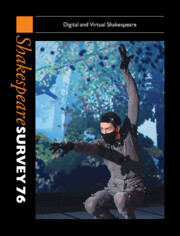Book contents
- Shakespeare Survey 76
- Shakespeare Survey
- Shakespeare Survey
- Copyright page
- Editor’s Note
- Contributors
- Contents
- Illustrations
- All Early Modern Drama Is Virtual to Us
- RSC Live from Stratford-upon-Avon: Ten Things I Think I Know, or, Of Course We’re Making a Movie
- Digital Ariel: An Interview with Mark Quartley
- Staging Digital Co-Presence: Punchdrunk’s Hybrid Sleep No More (2012) And Pandemic-Informed Pedagogies
- ‘Very Tragical Mirth’: Performing A Midsummer Night’s Dream on Screen(s) during Lockdown
- ‘Uneasy Lies the Head’: Michael Almereyda’s Halloween Cymbeline
- When Is King Lear Not King Lear?
- Sim-Ulating Shakespeare: From Stage to Computer Screen
- Metre in the Middle Distance
- ‘What’s in a “Quire”?’ Vicissitudes of the Virtual in Shakespeare’s Julius Caesar and Romeo and Juliet
- ‘And Which the Jew?’: Representations Of Shylock in Meiji Japan (1868–1912)
- Hamlet, Translation and the Linguistic Conditions of Thought
- The Pietas Of Dogberry
- Taylor Mac’s Gary and Queer Failure in Titus Andronicus
- ‘I Would Cure You’: Self-Help Advice on Love in Sidney and Shakespeare
- Shakespeare in Arden: Pragmatic Markers and Parallels
- Sycorax’s Hoop
- Shakespeare Performances in England, 2022
- Peter Kirwan, Productions Outside London
- Professional Shakespeare Productions in the British Isles, January–December 2021
- The Year’s Contribution to Shakespeare Studies
- Abstracts of Articles in Shakespeare Survey 76
- Index
‘I Would Cure You’: Self-Help Advice on Love in Sidney and Shakespeare
Published online by Cambridge University Press: 17 August 2023
- Shakespeare Survey 76
- Shakespeare Survey
- Shakespeare Survey
- Copyright page
- Editor’s Note
- Contributors
- Contents
- Illustrations
- All Early Modern Drama Is Virtual to Us
- RSC Live from Stratford-upon-Avon: Ten Things I Think I Know, or, Of Course We’re Making a Movie
- Digital Ariel: An Interview with Mark Quartley
- Staging Digital Co-Presence: Punchdrunk’s Hybrid Sleep No More (2012) And Pandemic-Informed Pedagogies
- ‘Very Tragical Mirth’: Performing A Midsummer Night’s Dream on Screen(s) during Lockdown
- ‘Uneasy Lies the Head’: Michael Almereyda’s Halloween Cymbeline
- When Is King Lear Not King Lear?
- Sim-Ulating Shakespeare: From Stage to Computer Screen
- Metre in the Middle Distance
- ‘What’s in a “Quire”?’ Vicissitudes of the Virtual in Shakespeare’s Julius Caesar and Romeo and Juliet
- ‘And Which the Jew?’: Representations Of Shylock in Meiji Japan (1868–1912)
- Hamlet, Translation and the Linguistic Conditions of Thought
- The Pietas Of Dogberry
- Taylor Mac’s Gary and Queer Failure in Titus Andronicus
- ‘I Would Cure You’: Self-Help Advice on Love in Sidney and Shakespeare
- Shakespeare in Arden: Pragmatic Markers and Parallels
- Sycorax’s Hoop
- Shakespeare Performances in England, 2022
- Peter Kirwan, Productions Outside London
- Professional Shakespeare Productions in the British Isles, January–December 2021
- The Year’s Contribution to Shakespeare Studies
- Abstracts of Articles in Shakespeare Survey 76
- Index
Summary
Setting aside the fancy (pleasing though it is) that Elizabethan and Jacobean society pullulated with hot lovers, critics have offered a range of weighty explanations for the popularity of the literature of obsession, from attracting the attention of the monarch, to artistic rivalry, to making subjectivity the subject of study.1 This article suggests a more tongue-in-cheek approach to advice on love in Sidney and Shakespeare, based on recent reappraisals of the use to which self-help books are put. Readers approach these as refreshing fantasies of a radical potential change in lifestyle, but with little intention of putting most (if any) of their advice into practice. From this perspective, Astrophil and Stella (1591) depicts a lover who encourages counsel only to resist it, a move which gives a new view of the love-cure game played between Rosalind and Orlando in As You Like It (1599).
- Type
- Chapter
- Information
- Shakespeare Survey 76Digital and Virtual Shakespeare, pp. 150 - 162Publisher: Cambridge University PressPrint publication year: 2023

